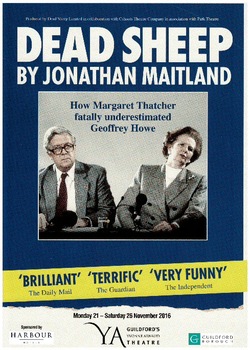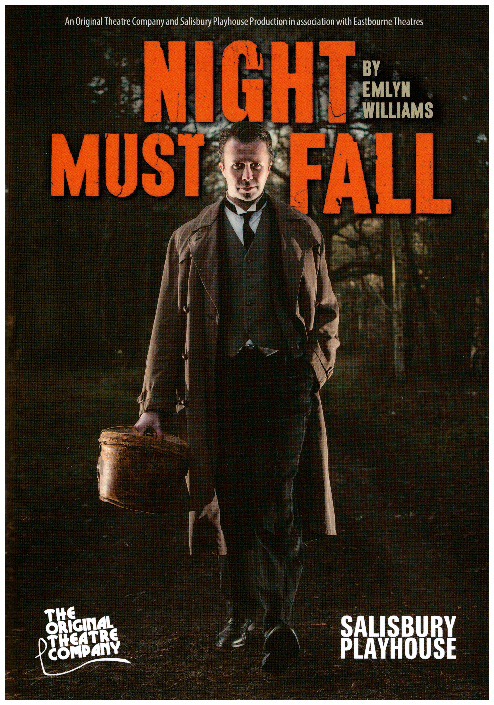The plot: news of a missing woman reaches the isolated cottage of Mrs. Bramson, a spoilt elderly hypochondriac who bullies her servants, including Olivia, her plain, penniless niece. Mrs Bramson is duped easily by Dan, a young man who arrives uninvited and ingratiates himself with the female household. He winds everyone around his little finger except Olivia, who suspects his true nature as a fantasist and possibly a dangerous psychopath.
The story literally starts with a bang, to set the scene for unexpected happenings, and rises in the second act to a threatening climax and an unexpected outcome. In between, there’s a great deal of humour. Hubert, who is courting Olivia with little success, is played by Alasdair Buchan with a nod to the young men in P.G.Wodehouse’s books of the 1930’s, and Mrs Terence, the redoubtable cook, is played with great gusto by Mandi Symonds: she is not to be bullied and tells her unlovable employer so in no uncertain terms, in every word and gesture, to great comic effect at times. Gwen Taylor’s Mrs Bramson is self-absorbed and domineering, but vulnerable to flattery. Will Featherstone as Dan manipulates the women with volatile moods; veering from reassuringly (or at times frighteningly) assertive, to charming and entertaining, to scared and infantile, his portrayal of Dan is fluid and charismatic. All the performances are excellent, individually and ensemble: Melissa Vaughan as the timid maid servant, the victim of Dan’s amoral lust; Darah O’Malley, who as Inspector Belsize strikes a note from “An Inspector Calls”; Nurse Libby, tactful district nurse, and Niamh McGrady, who as Olivia (in reality anything but “plain”) manages to make an unexpected change of heart convincing – but I’ll say no more. This is a well-crafted, vivid production that transcends its period setting, with blood-curdling surprises – but no blood. Go and catch this classic psychological thriller at the Yvonne Arnaud this week if you enjoy suspense, humour and the ever-present possibility of “things that go bump in the night”. This review will be published on the Essential Surrey website today, with photos and details of how to buy tickets.
0 Comments
 Anyone who remembers the satirical Spitting Image TV show will love Dead Sheep, Alan Maitland’s new play about the public clash between Margaret Thatcher and her Deputy Prime Minister Sir Geoffrey Howe in 1990. In this tragi-comedy about the end of Thatcher’s dominance in British politics, the Iron Lady herself is played memorably by Steve Nallon, the voice of Thatcher in the show. Taller and more threatening than any of her colleagues in her all-male cabinet, Nallon’s charismatic figure looms above Paul Bradley as Geoffrey Howe. This mild-mannered man had been Thatcher’s devoted supporter for eighteen years. Denis Healey had famouly compared Howe’s performance in the House of Commons as “like being savaged by a dead sheep.” But, pushed too far, Howe showed that where his strongly-felt political opinions on the UK’s membership of Europe were concerned, he could speak out like “the mouse that roared”, in a resignation speech that took everyone by surprise with its forthright condemnation of his leader’s attitudes. Excellently constructed using a trio of narrators and vignettes of incidents from the months that led up to Howe’s stand, this is about a man answerable to two strong women: his leader, Margaret Thatcher and his wife, Elspeth, between whom sparks fly. Elspeth is sympathetically played by Carol Royle. Incensed by Thatcher’s sacking from the post of Foreign Secretary in 1988, and a sequence of public humiliations of her husband, she encourages him to express his own political ideals. Paul Bradley’s portrayal of a man caught like a rabbit in the headlights of these two strong women is both tragic and very funny. Graham Seed, Christopher Villiers and John Wark are narrators, chorus and the politicians and journalists who watch and comment on the sidelines, and there are some great comic performances from them. The very funny scene when Howe is trying to arrange an appointment to see the PM through telephone calls to their respective staff is handled with tremendous panache and skilled stagecraft. Christopher Villiers’ portrait of Alan Clark is wonderfully venal and leads to hilarious scenes when Elspeth has to deal with his flirtatious advances. Satirical, but based on historical fact, Dead Sheep treats themes of political morality, revenge, loyalty and betrayal with a light but incisive touch. Its other topics, of political morality and “Britishness”, resonate twenty-six years after Geoffrey Howe’s political and personal stand, as relevant today as they have ever been. A great evening of comedy with an edge. 4 stars Janice Windle 21/11/2016 |
Archives
November 2023
Categories
All
|

 RSS Feed
RSS Feed